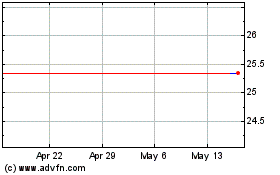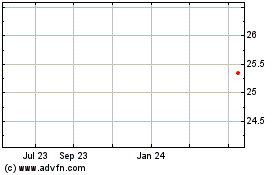2nd UPDATE: Exxon Sells Australia Filling Stations To 7-Eleven
May 27 2010 - 2:45AM
Dow Jones News
Exxon Mobil Corp. (XOM) has sold its entire Australian network
of 295 filling stations to 7-Eleven Australia for an undisclosed
sum after an agreement to sell them to Caltex Australia Ltd.
(CTX.AU) for around A$300 million was blocked by antitrust
regulators.
The sale, flagged last week by local media, makes good on the
U.S. oil giant's desire to exit its smaller-scale Australian retail
operations to concentrate on opportunities further up the value
chain and boosts privately-owned 7-Eleven's footprint to over 650
stores.
7-Eleven, which has a license to operate and franchise stores in
Australia from U.S.-based 7-Eleven Inc., doesn't have a presence in
South Australia state and will on-sell Exxon Mobil's filling
stations there to private company Peregrine Corp.
Market watchers suspect that Exxon Mobil will eventually sell
its Altona oil refinery in Victoria state but the company has so
far indicated that it wants to keep its Australian wholesale
operations. "We're not currently looking at selling the Altona
refinery, but we always assess business opportunities," an Exxon
Mobil spokeswoman said.
Of 7-Eleven's current 400 stores, about half of them already
sell gasoline, supplied mostly by Royal Dutch Shell PLC.
Any Exxon Mobil filling stations already supplied by Exxon
Mobil's Altona refinery will continue to be supplied under those
arrangements, a 7-Eleven spokeswoman said.
She said that 7-Eleven doesn't expect the deal to be subject to
regulatory clearance, although she added that the competition
regulator may examine the deal's potential impact on specific
geographic areas.
The Australian Competition and Consumer Commission in December
blocked the sale of 302 Exxon Mobil filling stations to Caltex,
which is 50%-owned by Chevron Corp. (CVX), after finding that
competition would be substantially reduced at 53 specific
sites.
The Exxon spokeswoman said the number of stations in its network
has shrunk to 295 from 302 because seven stations have either
changed ownership or their leases haven't been renewed.
When it rejected the Caltex deal, the ACCC said it also had
broader concerns about its impact on the "stability and
effectiveness of coordination between major fuel retailers in
determining prices", meaning it would have likely rejected the deal
even if Caltex agreed to divest the 53 sites of concern.
ACCC Chairman Graeme Samuel has previously referred to what he
considers to be a "comfortable oligopoly" in Australia's gasoline
market. In 2007, the ACCC conducted an inquiry which found that
while there was no "obvious" evidence of price fixing in the
market, there were operational concerns.
The regulator said in December that it was satisfied that Exxon
Mobil will exit its Australian retail business within the next two
or three years.
A pairing with 7-Eleven will create Australia's third biggest
private company and biggest independent fuel retailer with
projected annual sales above A$2.84 billion, 7-Eleven said.
-By Ross Kelly; Dow Jones Newswires; +61-2-8272-4692;
ross.kelly@dowjones.com
Caltex Australia (ASX:CTX)
Historical Stock Chart
From Nov 2024 to Dec 2024

Caltex Australia (ASX:CTX)
Historical Stock Chart
From Dec 2023 to Dec 2024
